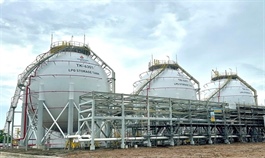Lawmakers seek clarity on valuing share contributions in revised enterprise law
Lawmakers seek clarity on valuing share contributions in revised enterprise law
Questions have been raised regarding the valuation of shares that are contributed as capital.

The headquarters of the Hà Nội Stock Exchange (HNX) on Phan Chu Trinh Street, Hoàn Kiếm District, Hà Nội. — VNA/VNS Photo |
During discussions on the draft revised Law on Enterprises, National Assembly deputies have raised concerns about the methods used to determine the market value of share contributions.
Specifically, questions have been raised regarding the valuation of shares that are contributed as capital.
At a group discussion on May 10, regarding the draft amendments to the Law on Enterprises, deputy Đỗ Đức Hiển of HCM City commented on point b, clause 1, Article 1 of the draft law, which regulates the market price of contributed capital or shares that are listed or traded on the stock market.
The draft law stipulates that the market value of contributed shares is determined by the average trading price within 30 days, rather than the trading price on the market immediately prior, as in the current Enterprise Law.
The rationale for this change is that the immediately preceding price may not be accurate if the stock experiences a sudden fluctuation.
"But will the 30-day average price reflect objectivity? Because 30 days are quite a long time while the market fluctuates continuously," Hiển questioned.
He added that the draft law retains two other methods of determination: the price agreed upon between the seller and the buyer and the price determined by an appraisal organisation.
This creates three different methods for determining the market price of contributed capital or shares listed or traded on the stock market.
Hiển expressed concern about which method should be chosen if the three methods yield different results and suggested that a hierarchy of preference should be established.
He also proposed adopting the method of determining the market price of contributed capital as shares according to international financial reporting standards currently being researched in Việt Nam.
In addition, the draft law supplements regulations allowing companies to reduce their charter capital when returning contributed capital to shareholders holding redeemable preference shares.
However, Hiển noted that Clause 2, Article 114 of the current Enterprise Law allows companies to issue other preference shares that may also have redeemable features.
As a result, he suggested that the draft law supplement regulations allowing joint stock companies to reduce their charter capital when repurchasing other preference shares with similar redeemable features as in the case of repurchasing redeemable preference shares.
Another deputy, Trần Anh Tuấn, also from HCM City, said that the amendments to the Law on Enterprises reflect a shift in management from pre-inspection to post-inspection, which he sees as a progressive step.
He also noted that the draft law delegates greater authority to the members' council and the representative agency of the enterprise owner to handle certain enterprise-related issues in order to meet the requirements of mobilising social resources for investment and development.
Tuấn pointed out that the draft law introduces the concept of a beneficial owner of an enterprise, which is a new concept that includes a group of people, including ordinary shareholders who own a certain number of shares.
This concept gives rise to the obligation to disclose information for domestic and foreign beneficial owners.
However, Tuấn said that while it is feasible to disclose information to the business registration agency about changes in beneficial ownership for unlisted companies, the draft law does not clearly address the disclosure obligations of beneficial owners in listed companies.
"Meanwhile, in listed companies, due to stock trading activities, the beneficial owner changes every second, so how is information disclosed about this change?" Tuấn asked.
He suggested that the regulations should be consistent for beneficial owners in listed companies, both domestically and abroad, regarding the obligation to disclose information.
Tussdn also argued that the regulation increases compliance costs for businesses and proposed managing it through post-inspection, with inspections only triggered if suspicions arise.
- 07:54 15/05/2025
























